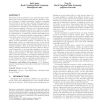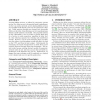329 search results - page 55 / 66 » A Theory of Secure Control Flow |
119
click to vote
JSAC
2007
15 years 1 months ago
2007
— One of the distinctive features in a wireless ad hoc network is lack of any central controller or single point of authority, in which each node/link then makes its own decision...
CHES
2005
Springer
15 years 7 months ago
2005
Springer
Abstract. It has recently been shown that logic circuits in the implementation of cryptographic algorithms, although protected by “secure” random masking schemes, leak side-cha...
117
click to vote
CCS
2005
ACM
15 years 7 months ago
2005
ACM
Automated trust negotiation is an approach which establishes trust between strangers through the bilateral, iterative disclosure of digital credentials. Sensitive credentials are ...
TON
2002
15 years 1 months ago
2002
In multi-hop networks, packet schedulers at downstream nodes have an opportunity to make up for excessive latencies due to congestion at upstream nodes. Similarly, when packets inc...
127
click to vote
CCS
2006
ACM
15 years 5 months ago
2006
ACM
Location-hidden services, as offered by anonymity systems such as Tor, allow servers to be operated under a pseudonym. As Tor is an overlay network, servers hosting hidden service...


